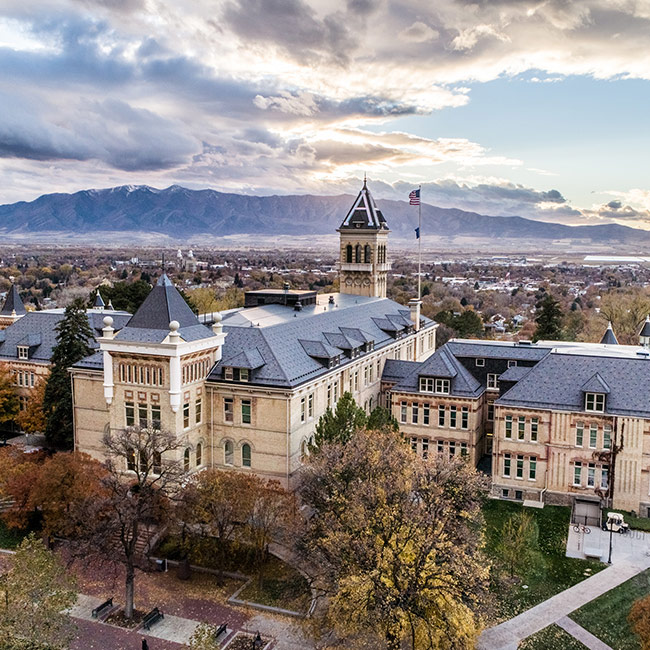About This Degree
The nutrition and food science program focuses on the chemical and biological components of food and the ways in which these ingredients affect health.
Due to an increased awareness in recent years of how food directly affects the population’s health, there is a greater demand for professionals trained in nutrition and food science. The general public has begun to realize just how important it is to eat well-balanced meals. This means that the opportunities for careers in nutrition are at an all-time high.
What You Will Learn
Students learn the chemical, biological, microbiological, nutritional, engineering and economic aspects of food, as well as the social impacts of the foods people eat, including how they affect various issues, including economy, psychology, and culture.
ADVISING
At a Glance
College: College of Agriculture and Applied Sciences
Department: Nutrition, Dietetics and Food Sciences Department
USU Locations:
- Logan campus
Program Requirements
Career And Outcomes
Career Opportunities
Graduates in nutrition and food sciences can pursue the following careers:
- Nutrition specialist
- Food scientist
- Research and development for food companies
- Quality control and safety assurance work
- Biomedical research
- Work in secondary schools as a nutrition specialist
- Pharmaceutical sales
- Food sales and marketing
- Quality assurance specialist
- Product development scientist
- Food technologist
- Food production manager
- WIC Nutritionist
- Nutrition education
- Food service manager
- Patient services manager
Job Outlook
USU Locations

LOGAN CAMPUS
Admission
Admission Requirements
Applicants are not required to have bachelor’s degrees in nutrition or food sciences, but they must have strong backgrounds in science and mathematics. There may be prerequisite courses needed for make up in some situations. These can be taken concurrently with graduate coursework and are determined on a case-to-case basis.
To be accepted to the program, it is recommended that applicants first contact a specific faculty member with whom they are interested in working. If the faculty member is accepting graduate students and agrees to work with the student, the student can then apply by completing the following application requirements:
Application Requirements:
- Complete the online application
- Pay the $55 application fee
- Score at or above the 40th percentile on the GRE
- Have a 3.0 or higher GPA on your last 60 semester or 90 quarter credits
- Provide transcripts of all college/university credits
- Provide three contacts for letters of recommendation
International students have additional admissions requirements.
Deadlines
The nutrition and food sciences graduate program has rolling admission, meaning the department will continue to consider and accept applications until the program is full. The time it takes to process an application is primarily dependent on the speed with which the School of Graduate Studies receives letters of recommendation, transcripts, and test scores. For most students, this process may take six to eight weeks. Applicants should plan accordingly.
Additionally, students may have better opportunities to receive funding if they apply in time for fall semester.
Program Requirements
PhD Qualifying Exams:
When a PhD student has completed the courses listed in their program of study, they schedule a meeting of their committee for the comprehensive examination. This is usually an oral examination, although committee members have the option of providing a written exam. Typically students will be asked questions related to their area of concentration and their field of research, but the comprehensive exam can also be used to test the student's overall knowledge of food science or nutrition.
Plan Options
Students can receive the MS by pursuing the following option:
- In the Plan A option, students complete graduate-level coursework and must write a thesis.
Financial Aid
All students typically receive some kind of assistantship; however, the department will accept students who are self-funded if there are no available assistantships remaining.
The Gandhi Scholarship is also available on a competitive basis to support outstanding students during their graduate education in food science. Awards are available for entering master’s degree students, as well as for PhD candidates. Applications are due February 1. To obtain an application, visit the Department of Nutrition, Dietetics, and Food Sciences website or contact the department.
A variety of funding opportunities are available on the graduate school website.
Graduate students in the department receiving a 0.5 FTE assistantship may not accept additional employment without written permission of their major professor and the department head; this policy is to ensure that graduate students have sufficient time available to complete the academic requirements of their degree in a timely fashion.
Take The Next Step
How to Apply
View our step-by-step guide on how to become an Aggie.
Request Information
Contact the School of Graduate Studies to ask questions or receive more information.
Cost and Funding
Calculate the cost of graduate school and learn about funding opportunities.
You May Also Be Interested In

Dietetics Administration
Become a leader in the field of nutrition and dietetics as you enhance your career opportunities in this professional program.

Food Safety and Quality
Receive in-depth training in food safety assurance as you prepare for a career in food quality assurance.

Public Health Nutrition
The MPH program in Public Health Nutrition includes interdisciplinary training in nutrition-related sciences and the core public health disciplines.

